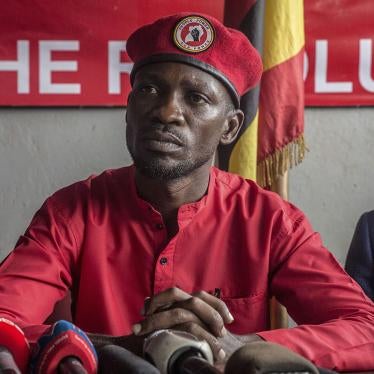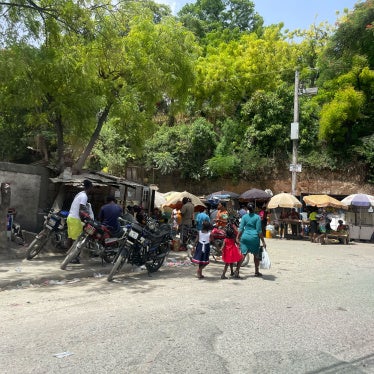The upcoming trial in Tashkent of a Muslim cleric kidnapped by Kazakh state agents in Kazakhstan and sent back to Uzbekistan highlights concerns about the safety of Uzbeks who have fled to Kazakhstan to avoid persecution and the risks of mistreatment they face if they are forcibly returned, Human Rights Watch said today.
In the trial, which is expected to start Monday in Tashkent City Court, Imam Rukhiddin Fakhrutdinov will face an array of charges, including some involving religious extremism and terrorism.
“Kazakh authorities have yet to acknowledge any role in Fakhrutdinov’s transfer to Uzbekistan, and this is profoundly disturbing,” said Holly Cartner, Europe and Central Asia director at Human Rights Watch. “This suggests that Kazakhstan is not living up to its obligations under international law to protect those fleeing persecution and to prevent people from being returned to places where they risk torture.”
Fakhrutdinov was abducted by Kazakh security agents in Shymkent, in southern Kazakhstan, on November 24, 2005, and sent to Uzbekistan on November 27. He was among dozens of other Uzbek nationals who fled religious persecution in Uzbekistan and were living in southern Kazakhstan. A total of 17 Uzbek citizens, including four registered asylum seekers, were “disappeared” in late November and were later acknowledged to be in Uzbek custody.
Kazakh officials deny they were responsible for seizing and transferring these people. Uzbek authorities say that the men were arrested in Tashkent province, to which several of the other deportees have testified, even though two of them had filed asylum applications with the United Nations High Commissioner for Refugees (UNHCR). Their trials were held in April and May 2006.
But Fakhrutdinov has told his lawyer that masked men detained him in Shymkent on the morning of November 24, and that he was kept for three days in Kazakh national security custody, where he was beaten. He also said that Uzbek security and law enforcement officials have pressed him to state that he was detained on Uzbek territory.
In March, Human Rights Watch wrote a letter to President Nursultan Nazarbaev of Kazakhstan to provide him with detailed information, including some eyewitness testimony, showing how Fakhrutdinov and 16 other Uzbek nationals – four of them asylum seekers formally registered with the office of the UNHCR – were seized in Shymkent and transferred to Uzbekistan.
Human Rights Watch expressed concern about Fakhrutdinov’s right to a fair trial, which it said was undermined by due process violations during the investigation. Fakhrutdinov was denied access to his attorney of choice for two months after his forced return to Uzbekistan, and indicated to his lawyer that he was beaten in Uzbek custody. He has been held in a basement cell of the Ministry of Internal Affairs and not, as is the usual procedure, in the Tashkent remand prison. Fakhrutdinov is accused by the Uzbek authorities of involvement in the 2004 political violence in Tashkent and Bukhara.
The relative and lawyer of another Uzbek citizen abducted from Kazakhstan told a representative of Human Rights Watch that this man was beaten in national security custody both in Shymkent and Tashkent, sustaining severe injuries to his head.
“The mistreatment of these men after they were sent back to Uzbekistan illustrates why protection from forced return is so needed,” said Cartner.
About 80 Uzbek nationals who fled religious persecution in Uzbekistan remain in Kazakhstan and have faced harassment, surveillance and threat of forced return. At least nine are currently wanted for extradition to Uzbekistan. Like Fakhrutdinov, they are independent Muslims, or religious Muslims whose practices, beliefs and affiliations go beyond government-approved Islam. Most are associated with Imam Obidkhon Nazarov, a well-known independent Muslim leader who currently has asylum in Europe and is wanted by Uzbekistan for supposed leadership of a “Wahhabi movement.”
On June 24, an Uzbek refugee in Kazakhstan, Gabdurafih Temirbaev, was detained on false allegations, and has since remained in the custody of the Committee for National Security of Kazakhstan, on the basis of an Uzbek extradition request. UNHCR was granted access to him two weeks ago.
Seven other Uzbek nationals, also facing charges made by the Uzbek authorities relating to “religious extremism” for their alleged affiliation with the banned Islamic movement “Akramia,” and to the Andijan uprising, are also believed to have been forcibly returned from Kazakhstan in late November and are currently awaiting trial in Uzbekistan.
In a 2004 report, Human Rights Watch documented the arrest and torture of many independent Muslims in Uzbekistan. The persecution of the families of Fakhrutdinov and Nazarov is also detailed in this report.






